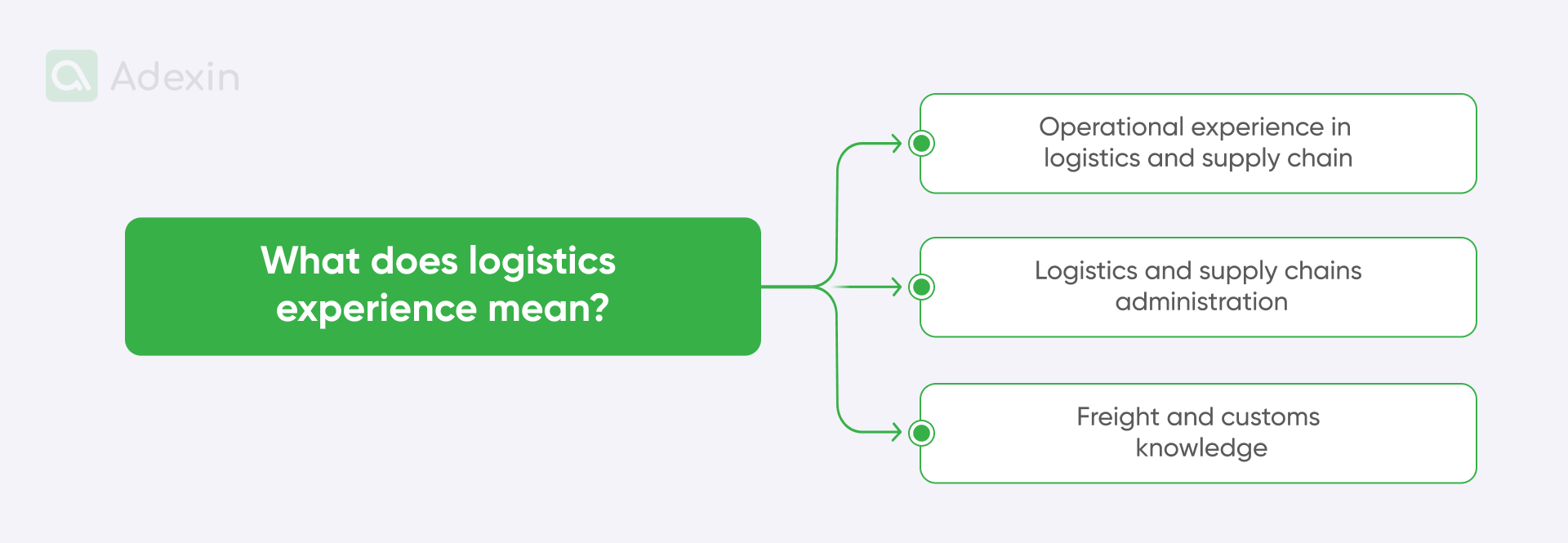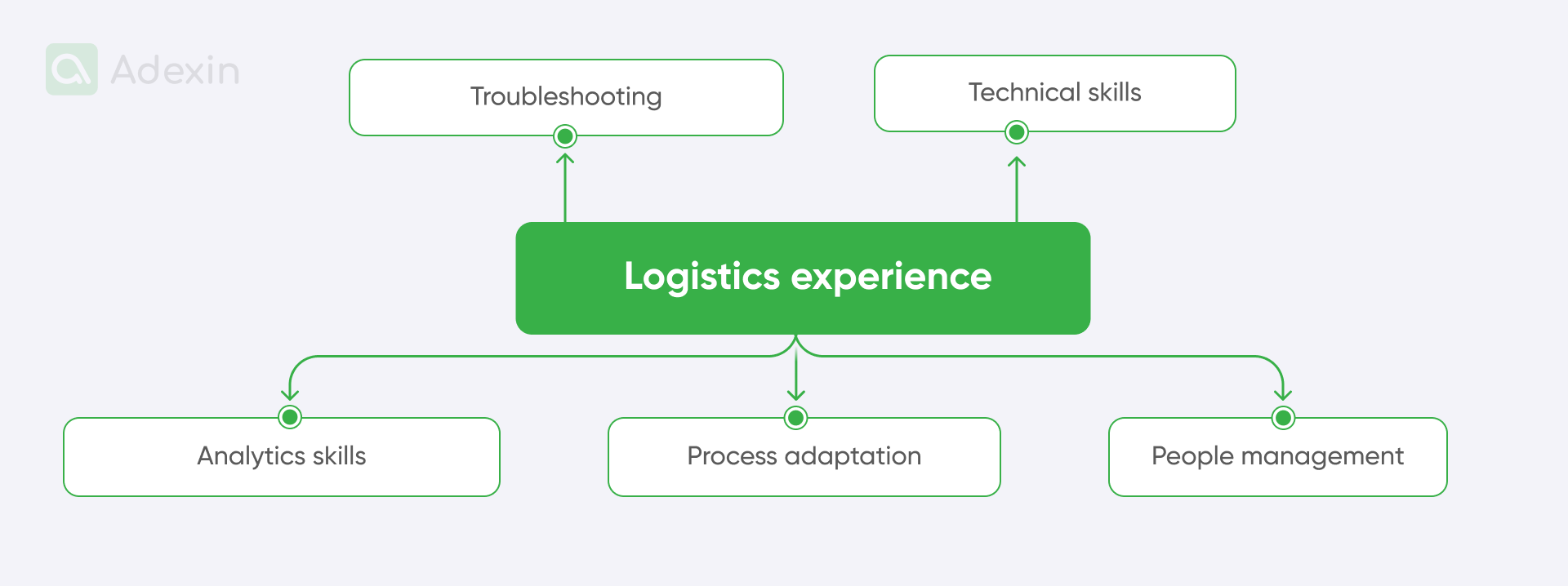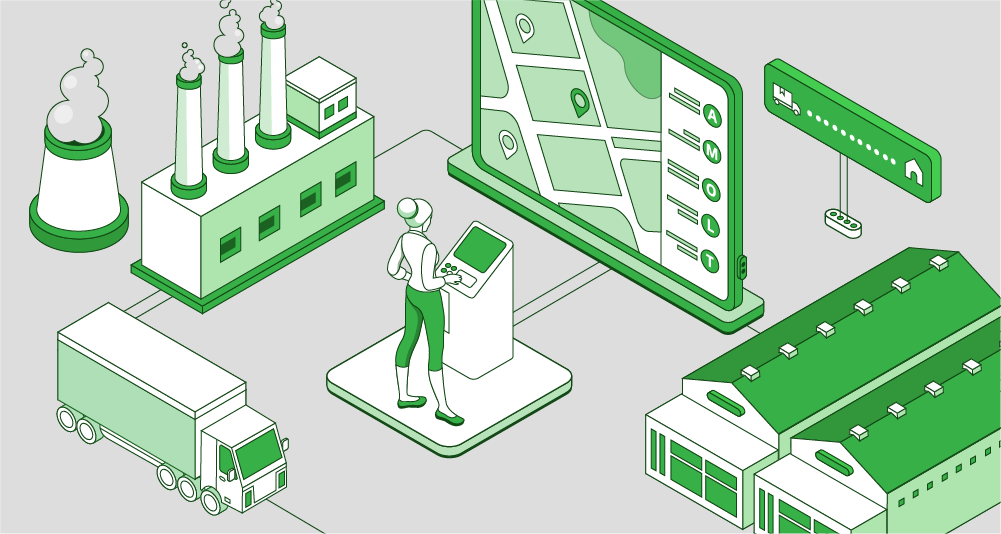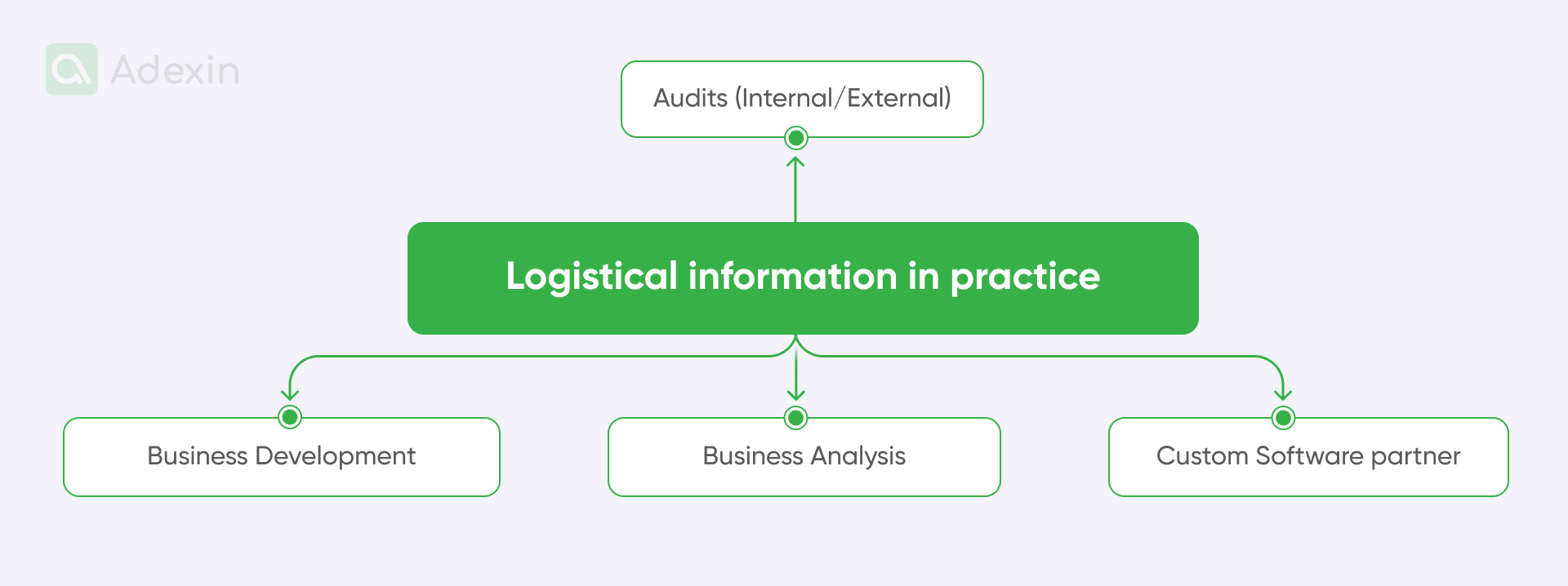In logistics, a common path to gaining experience is building it up over the years, from low-tier functions such as warehouse clerks to operational managers. One of the best things about logistics is that you can really grow your career based on years of experience, regardless of your education level. All you learn over the years impacts your work on a daily basis.
In this article, we'll reveal the meaning of the logistics experience you can gain in an organization and why it is so crucial in decision-making. This article will be helpful for management to understand better the supply chain and logistics management experience gained from people who have also spent years in the logistics industry by observing.
What does logistics experience mean?
Logistics experience matters a lot when handling operations from inbound to outbound, personnel management, and keeping customer satisfaction high. This term reveals what is essential for today's logistics success.
In today's logistics and supply chain, due to a shortage of qualified personnel, it is common for people to be evaluated based on their business experience. This approach in management leads to the promotion of low-tier employees to higher functions and can lead to success. A typical path of building experience in a logistics organization to a leadership role includes warehouse clerks, team leaders, and supervisors up to management functions.
Of course, this career path can be broken into various positions, such as business analyst, customer service, and OSG clerk (operations support group), which involve more administrative tasks.
But if we are talking about the professional way of gaining experience, it will be from WHS clerk to management. I'm sure that many logistics managers share my point here. I have seen how people in the logistics industry in the Netherlands grew over the decade, from clerks to managers. They have been great managers, mostly with hands-on experience in people management and operational processes. Of course, again, this is not the rule, and those who become managers are sometimes great leaders with the right experience level.
Here are the areas that matter in the context of logistics experience:

Operational experience in logistics and supply chain management
This is about experience and knowledge in handling inventory, using technology, and understanding what is required for using internal equipment and transportation. Logistics requires constant management of minor or more significant issues in operations to solve daily problems. If you have faced some cases on your own, for example, seeing accidents with EPT trucks when drivers crossed the walking path, you know better how important it is to prevent such incidents.
More important might be sticking to the time frame for loading and unloading trucks. We all know that warehouse docks need to be released for other cargo that can arrive in the scheduled time window. Delays are costly, so you need to know, using your logistics experience, how to plan unloading, how much time you need, how many people should support the process, etc.
Logistics and supply chains administration
Here, we move a bit away from the WHS to the office, sometimes called the Operation Support Group (OSG). Here, the set of tasks is different but constantly connected to warehouse operations. People in the office can run various functions, from business analysis to transport coordination, or administrative clerks are responsible for managing the Fleet MS system.
Over the years, a lot has happened in the office, so logistics experience here involves understanding the roles in the office to run shipping operations smoothly. Why shipping first? Because it's about maintaining a good flow. The most crucial aspect for operations managers is that volumes are outbound on time. Of course, on-time delivery is vital too.
Freight and customs knowledge
Freight is one aspect, but it only operates independently from customs operations, which are tightly connected. Your shipping operations, transport, route planning, and fleet management are all areas you learn over the years as a freight manager or OPS manager. As mentioned earlier, knowledge here is also related to the OSG group. Of course, if we're talking about international freight, you need to have experience in customs operations. This subject covers experience with freight modalities, from shipping by air, by road, or by sea cargo. It's so complex that the learning curve is constant for growing logistics experience.
What is considered logistics experience?
I would say skills. If you ask, after years of working in logistics, skills are what matter as logistics experience. We're not talking here about the years you spent doing the job, but what you can take outside. So, again, I will tell you that the skill set you can use is more valuable than years and even your education level in logistics, of course, this will depend strictly on the career path!
Here is the set of skills that can qualify your logistics experience to be considered high-level:

Troubleshooting in logistics and supply chain management
To be a good troubleshooter, you need to know a lot about all aspects of logistics, from operations to freight, as mentioned above. Only then can you apply solutions to problems you face. Troubleshooting is a soft skill you should develop with others in your life. However, you can also learn this in logistics, and how you handle issues is how you leverage your experience.
Technical skills in supply chain operations and logistics
Scanners, internal transport, knowledge about robotics and automation, and even pragmatic things like MS Office. It would help if you were comfortable using scanners (barcode, RFID) for inventory management and mastering MS Office applications (Word, Excel, macro, VBA, PowerPoint) for reports and presentations (everywhere I worked, I saw this system only!). Of course, there is far more you should know to feel that your logistics experience is at the right level.
You should know various means to outsource companies that you may need in logistics. You don't want a situation where a van driver is telling you that he can deliver ten pallets from your warehouse within 2 hours to the airport, while this is not only about the distance but also security processes at the airport and hundreds of other reasons that make delivery 4 hours long.
Analytics skills of supply chain management professionals
Knowledge about analytics and demand forecasting is crucial. You must understand data analysis to identify trends and forecast future customer demands. Managing inventory means optimizing inventory levels and shipping volumes and making good career choices. When it comes to international logistics, everything is getting way more complicated, and you need to know not only how to look into the numbers on the domestic markets but also foreign and abroad.

Process adaptation like a very important skill for a logistics manager
Logistics is exposed to constant change. You need to know the process to understand what factors in logistics can influence them. For example, if we have a packing process in VAS, you need to see if you will need one or two more persons when demand can increase over two weeks.
So, if there is a people shortage, you need to plan upfront to get them in-house within two weeks and have a few days for training on VAS. Process adaptation is about change and a bit about problem-solving. Be adaptable to new processes and technologies while possessing strong problem-solving skills to find creative solutions and improve efficiency.
People management like an important skill of a supply chain operations manager
This skill requires communication and teamwork skills. I would say that it is even more important than all other skills combined. But of course, one doesn't exclude the other. Communicating clearly with team members, supervisors, and clients is super important. Working effectively in diverse teams and showing leadership when needed is also challenging.
Just imagine the diversity in today's warehouses when you have people with up to 10 different nationalities under one roof. It's not only about handling gender challenges but also cultural ones. And believe me, many European cultures vary a lot, not only because of religions but also due to other social issues you must understand to manage your people effectively. Other logistics experience elements can leverage this skill and help you better choose the right people for the right functions.
Logistical information in practice
There are some areas in the business you cannot just jump over, and rather, you won't gather knowledge on specific areas that require technical knowledge and expertise. Explain this through several elements where you may need support in this context. Because asking experts about their insights doesn't make you less experienced but even the opposite. Only a good logistics leader understands the value of partnerships and recognizes when they may need support from subject matter experts.
Here are the areas where you may need 3rd party support, advice, or partnership to remain more effective in logistics:

Internal and external audits
Focusing on internal/external audits helps you objectively assess the effectiveness of your company's processes, controls, and procedures. These audits can cover various aspects, such as increasing productivity in logistics by evaluating how efficiently resources are utilized. Other audits can focus on safety, helping you identify potential hazards and ensure compliance with safety regulations, this might be an audit before 5S/6S implementation.
Security audits can examine data security practices and identify vulnerabilities to prevent breaches. Financial audits in logistics allow you to review records for accuracy and adherence to accounting standards. Audits bring benefits and provide valuable insights to improve operational efficiency, mitigate risks, and ensure regulation compliance.
Business development
The main goal is identifying and pursuing growth opportunities. OPS managers run internal activities in the warehouse, but when it comes to supply chain or other commercial functions, your logistics experience needs to cover activities that understand business units. You must know how to match fulfillment logistics expectations with your warehouse capacity.
Here, you need close cooperation with someone who can help you with market research, analyzing market trends, and identifying new customer segments. This person can leverage your experience by helping you build relationships with other companies to expand reach and access new markets while also handling requirements internally in the warehouse. Frankly, it's a bit of a sales & marketing position, but it all needs to be included in strategies for warehouse distribution, as you often won't get targets from nowhere. Effective business development fuels a company's long-term success and ensures sustainable growth, both outside and inside.
Business analysis
Here, I have a bit to say. It is a role that bridges the gap between business needs and IT solutions. Its responsibilities include defining and translating business objectives into functional and technical requirements for software solutions, new processes, or other projects.
The main goal is process improvement through analyzing current business processes to identify enhancement areas and develop optimization solutions. It also involves data analysis and interpretation to generate insights that inform business decisions. This person can leverage your experience in logistics to help you save costs, both in personnel hours planning and implementing new solutions.
Custom software development
A business analyst can tell you that you need a software solution and define who can create this for your logistics business. You need to partner with a software business in your niche to get the right custom software such as any kind of logistics management software, TMS system, or WMS system, with relevant logistics experience that also helps the organization's supply chain.
Only a company with relevant logistics experience in building software specifically to meet unique needs and workflows can help with your organization's particular needs. At Adexin, we know logistics inside out, so you can partner with us to develop your DMS system or benefit from a truck assistance app. You cannot do it on your own, even if you have a lot of experience in logistics; you need this experience to outsource to leverage your business.
If you grow from low-tier functions, it is crucial to understand key business functions. Business is business, and you need to know how to run a profitable business, even in logistics. You won't get to know this so much if you stick to your hub in a warehouse where you run 20 people, and that's it. You need to ask people for advice to leverage your logistics experience. Making smart decisions by leveraging the experience of others is to outline your true logistics experience.
Are you in search of a reliable tech partner?
Adexin can help with advanced logistics solutions
Contact usSummary: message to logistics managers and supply chain professionals
While you excel at internal warehouse operations, expanding your skill set to run business logistics can unlock incredible growth potential. You gain more experience in logistics in many ways. Due to a staff shortage, it's often about learning by doing. However, you can also use the experience of others by collaborating with business analysts, developers, or custom software agencies. So, ask yourself, do you want to have poor logistics or get a highly competitive edge?
Explore opportunities to collaborate with business development professionals and pursue better performance in your logistics area. Embrace market-driven growth initiatives with us. Our custom logistics software development service can ensure the long-term success of your warehouse and logistics operations.

